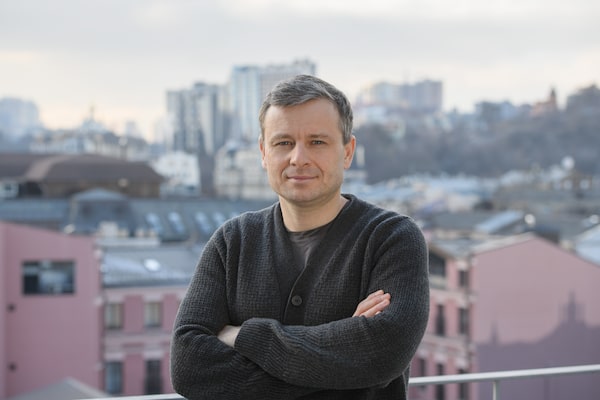
Ukraine's Minister of Finance Sergii Marchenko stands outside the Ministry of Finance offices on Jan. 29.Olga Ivashchenko/The Globe and Mail/The Globe and Mail
Ukraine’s Finance Minister is preparing an emergency budget in case the European Union and the United States fail to deliver tens of billions of dollars of financial aid to keep the government fully functioning and the military effort alive as the war with Russia enters its third year.
Serhiy Marchenko told The Globe and Mail that 2023 ended fairly well, with sufficient foreign funding and a return to growth after the near economic collapse of the previous year. But he is less confident that the financial picture will remain intact in 2024.
“I am here to avoid a crisis,” he said from the Ministry of Finance building in Kyiv on Monday. “I am here to provide some options on how to avoid it if we do get no support. It could be monetary financing, it could be tax increases or it could be a reduction in non-priority expenditures. A lot of questions still exist.”
The biggest questions are whether the EU and the U.S., the biggest providers of budgetary assistance to Ukraine, will be able to maintain their high funding volumes.
The European Commission, the executive arm of the EU, has pledged €50-billion (about $72.68-billion) over four years to help keep the war economy afloat. But Hungarian Prime Minister Viktor Orbán, who has maintained close ties to Russian President Vladimir Putin, has so far blocked the renewal of the funding package, which expired in December.
The financing pledges made by the administration of U.S. President Joe Biden face similar hurdles. The Republican-controlled House of Representative has refused to approve new aid to Ukraine because there is no parallel deal to reinforce the U.S.-Mexico border, through which thousands of undocumented migrants are reaching the United States.
Mr. Biden has urged Congress to pass a US$110-billion aid package for Ukraine, Israel – which is fighting Hamas militants in Gaza – and other security needs. Of that amount, slightly more than half would go to Ukraine.
Kyiv is desperate for the EU and U.S. funding to help fill its budget hole. All of the government’s tax revenue goes to the war effort – the military budget is more than US$40-billion a year. “We need additional financial and military support,” Mr. Marchenko said. “It’s a matter of survival. People living in peaceful Europe prefer not to think of this war any more. But it is still ongoing, it’s still a huge war.”
Trudeau accuses Poilievre of voting against Ukraine free trade to appease Putin
Since the start of the Russian invasion on Feb. 24, 2022, Ukraine’s international allies have provided about US$74-billion in direct budget support for pensions, government salaries, social services, humanitarian needs and other expenses to keep the government and the economy functioning, as Russia pulverized everything from the electricity grid to the Black Sea ports essential for keeping grain exports flowing.
Last year, Ukraine received US$42.5-billion in external financing. Among the biggest supporters were the EU, which provided US$19.5-billion, much of it in the form of loans, not grants; the U.S., with US$11-billion; Japan, with US$3.6-billion; and Canada, with US$1.8-billion. The International Monetary Fund provided US$4.5-billion. “We covered all our necessary expenses last year,” Mr. Marchenko said.
The new budget was designed to reduce Kyiv’s dependency on external financing. But at US$37-billion, it’s still hefty and essential if the central bank is to avoid another round of monetary financing – printing money – to prop up the country’s finances at the risk of unleashing runaway inflation (in the first year of the war, inflation hit a crushing 26 per cent as monetary financing kicked in; it is now slightly more than 5 per cent).
The government was able to shrink the budget somewhat by reducing capital spending, raising more revenue from the banks through a windfall tax and transferring US$2.5-billion from local governments to the national government.
Mr. Marchenko is fairly confident that the EU funds will come through as the EC tries to break the stalemate with Mr. Orbán. The Financial Times reported Monday that Brussels was considering ways “to sabotage” the Hungarian economy unless the government drops its veto of the Ukrainian funding plan at a special leaders’ summit Thursday. In response, Hungarian EU Minister János Bóka used X to say that “Hungary does not give in to blackmail.”
The sabotage effort would see EU leaders agreeing to freeze the bloc’s funding to Budapest. The EU has used such tactics before, freezing €20-billion (about $29.06-billion) of funding over concerns about Hungary’s LGBTQ+ policies.
Later Monday, the Hungarian government signalled its readiness to use the EU budget for the Ukraine aid package and to issue EU common debt to finance it as long as certain “caveats” were respected. Mr. Marchenko said he expects the stalemate to be broken by early February, allowing the funds to flow. “I am more optimistic than pessimistic,” he said. “They [the EU] should be ready to support Ukraine because, otherwise, we cannot stop this enemy, Russia, which is a threat to all of Europe.”
Mr. Marchenko, who is 43 and has been Finance Minister for almost four years, admitted he was more worried about the U.S. money than EU funding. He would not say whether he fears an election victory by former U.S. president Donald Trump, but Kyiv would clearly prefer a Biden win. “If Biden is re-elected, he will keep supporting Ukraine,” he said.
He also noted that the Biden administration has supported a bill that would authorize the use of some of the US$300-billion in frozen Russian assets for Ukraine’s postwar reconstruction (most of those assets are in Europe).
Earlier this month, Ukrainian President Volodymyr Zelensky told Britain’s Channel 4 News that Mr. Trump’s claim that he could stop the war in 24 hours was “very dangerous.” He said he feared Mr. Trump would make decisions “without us.”
 Eric Reguly
Eric Reguly